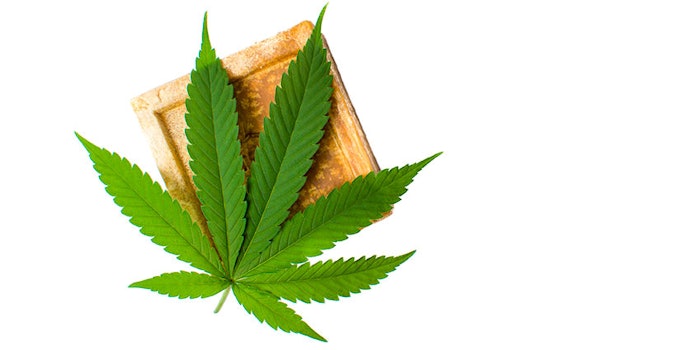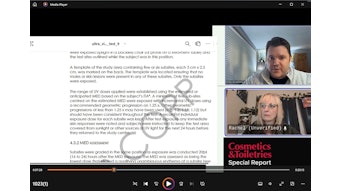
The U.S. Congress has passed a bill that would legalize the growth of hemp—a move that will be felt from formulators’ laboratories to consumers' vanities and lifestyles. The bill is widely expected to be signed into law by the president. (For industry impacts, see the section below labeled Cosmetic Industry Guidance.)
Previously, hemp and CBD oil were only available to U.S. formulators and researchers as an imported substance. The Hemp Farming Act of 2018 allows for the legal production of the ingredient, which in turn will make it much easier for formulators to access and create products with.
Further reading: CBD consumer trends.
The new bill defines “industrial hemp” as the plant Cannabis sativa L. and " ... all derivatives, extracts, cannabinoids, isomers, acids, salts and salts of isomers" containing less than 0.3% THC; this distinguishes it from marijuana, which contains a higher amount of THC and remains a class 1 controlled substance under the Controlled Substances Act.
Regulatory Status
As cosmetic ingredients, hemp and CBD oil have been growing in popularity with consumers as a result of the rise of wellness culture and the lowering of regulations.
Notably, though the new legislation provides federal guidelines regarding hemp and CBD, the ingredient is still subject to the U.S. Food and Drug Administration (FDA) and to individual state regulations. According to Jenelle Kim, Ph.D., cofounder and lead formulator of JBK Wellness Labs, this is positive and will benefit consumers.
“While the FDA will still look over everything, one thing that consumers need to be aware of during this time—on the flip side—is that everyone is going to jump in. What that means, and what we have seen for many years now, is that a lot of people who are hurrying to get into the industry take a lot of shortcuts, and that’s really not so great,” said Kim. “The hope is that ... the FDA and each state continue to work with the federal law and continue to open up the doors to everyone.”
Moving Forward
So, what does this mean for the cosmetic industry? That hemp, an already trending ingredient, is not going anywhere, at least according to Kim.
“I’ve been in the skin care and spa industry for almost 20 years now ... [hemp] is interesting because quite frankly, I've never seen an industry grow so quickly in this way, and so strong,” commented Kim.
The hemp and CBD market is growing so quickly that it is expected to reach $22 billion by 2022, outstripping the rest of the cannabis markets, combined. Regarding this expected growth, the Brightfield Group notes that, "All of a sudden, CBD is everywhere—it is both a trendy new ingredient in drinks, face creams and pet treats and an answer to the prayers of so many people suffering from medical conditions ranging from epilepsy to anxiety and chronic pain. It rides the waves of so many global food and health trends, as a substitute for opioids, towards more natural health alternatives and functional ingredients."
Kim is most interested in the claims that will be associated with this expected wave of hemp and CBD-containing products.
"I'm certain that as [hemp] continues to move it's going to be a household understanding. That's going to open up a lot of doors because everyone's going to come searching for it.
"Because it is such a powerful herb and has so many different properties for the mind and body, and for the skin, there are going to be so many different formulations and products that can be made from this one ingredient," said Kim.
The bill will amend the Agricultural Marketing Act of 1946. It was passed through U.S. Congress, and is pending a signature from the president. For more details, visit www.congress.gov.
Cosmetic Industry Guidance
ICMAD has issued an industry advisory regarding the impacts for cosmetics brands. The key details are quoted in full below:
What does that [passage of the bill] mean to the personal care industry? It does not mean that use of these other hemp substances is permitted in personal care products or any other FDA regulated products.
The FDA has taken a strong position that CBD's cannot be used in dietary supplements because use of CBD's in dietary supplements followed the approval of a New Drug Application in which CBD is the active ingredient. Supplements cannot contain ingredients that were approved for drug use prior to use in a dietary supplement.
Use of CBD's or any of the other materials found in hemp as a food additive requires prior FDA approval which must be based upon studies demonstrating safety at the do no harm level.
Use of any of the hemp materials as drugs, like the drug approved for epilepsy which contains CBD's, requires FDA approval based upon extensive studies establishing both safety and efficacy.
As to cosmetic use, THC's at low levels have been permitted in cosmetic products under a pre-existing guidance document issued by the Justice Department and followed by the FDA. The basis for this guidance was that there was little risk that the THCs in the product would enter the body. Use of other compounds found in Hemp in cosmetic products would require establishment of safety and these compounds are probably not ingredients that would have been studied in the Cosmetic Ingredient Review, so marketers are on their own to establish safety for these other hemp compounds for topical use in cosmetics.
The FDA's position on the use of these various substances - THC and CBDs - can be found on the FDA website by clicking on the following link: https://www.fda.gov/newsevents/publichealthfocus/ucm421168.htm










